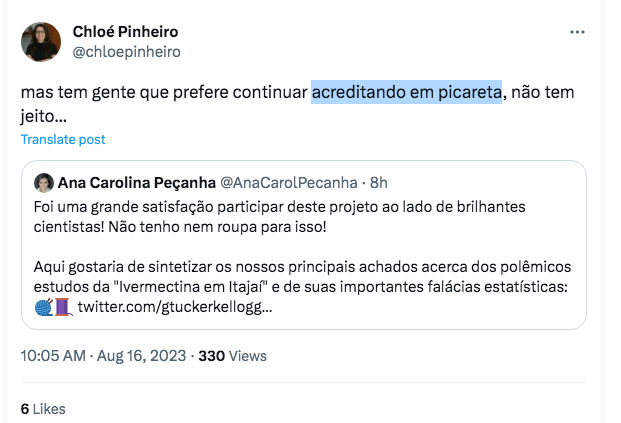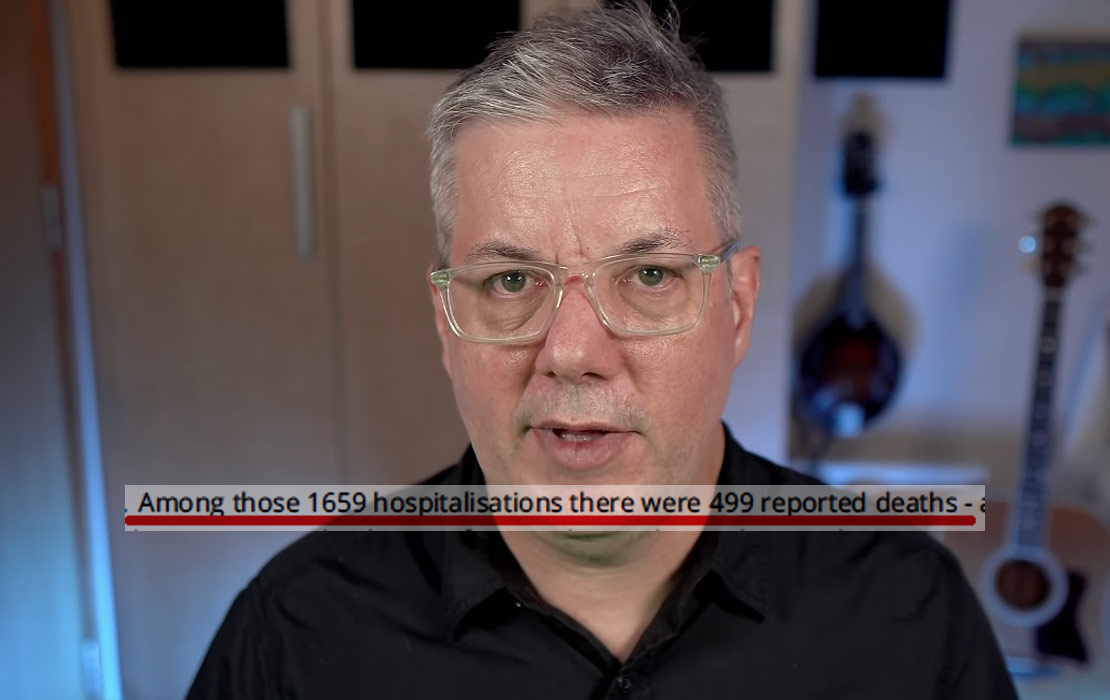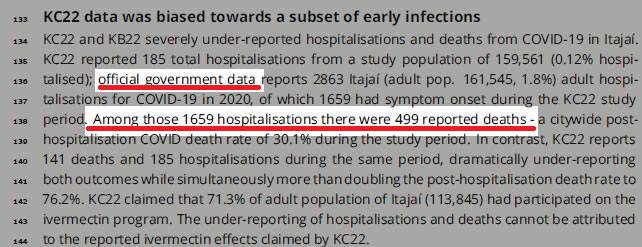Greg Tucker-Kellogg, from the Department of Biological Sciences at the National University of Singapore, who receives compensation from YouTube for creating content against scientific misinformation, along with two other authors, Ana Carolina Peçanha and Robin Mills, published a study on the Medrxiv platform on August 15th. The study used fraudulent data with the aim of undermining the research on ivermectin conducted in Itajaí, located on the coast of Santa Catarina, Brazil.
The study conducted in Itajaí, peer-reviewed and published in the prestigious Cureus journal in early 2022, concluded the effectiveness of ivermectin in its prophylactic use against COVID-19. The results were positive: among individuals who took ivermectin preventively, there were 68% fewer deaths, 56% fewer hospitalizations, and 44% fewer infections.
The False Data
Tucker-Kellogg and colleagues’ study, which aimed to recalculate and nullify the positive results, used fraudulent data to achieve its goal. In the article, they claim that the data is official.
The authors stated that 499 individuals died between July and December 2020, a period during which the effectiveness of ivermectin was studied in the city.
However, the data of 499 COVID-19 deaths during the six months of the study in Itajaí is indeed false. In order to achieve their desired outcome, the number of deaths had to be inflated. You can verify the original PDF of the reanalysis here on page 3.
How We Investigated
The purported 499 deaths in six months, used as a basis for the calculations, raised suspicions due to being an unusually high number for the period in a city with just over 200,000 inhabitants. Consequently, the first step we took was to research the city’s epidemiological bulletins during that timeframe.
The official epidemiological bulletin, published on the Itajaí city government’s website on December 28, 2020, stated that a total of 254 individuals had died since the beginning of the pandemic. This figure represents deaths from when the virus first spread in the city in early 2020. Therefore, the deaths between July and December were even fewer, far from the reported 499.
In a second attempt to verify the numbers, we accessed consolidated data from the Brazilian Unified Health System (Sistema Único de Saúde or SUS) through the OpendataSUS database, which is considered one of the most comprehensive and accurate in the world. As Brazil has a publicly funded healthcare system, data for all patients in the country is rigorously monitored.
The OpenDataSUS Numbers:
Deaths caused by Severe Acute Respiratory Syndrome (SARS), with dates ranging from July to December 2020, among residents of the city. Database downloaded on March 13, 2023.
Based on the date of hospitalization:
Total SARS-related deaths: 234
Deaths due to Covid-19 only: 222
Based on the date of symptom onset:
Total SARS-related deaths: 256
Deaths due to Covid-19 only: 237
Based on the date of data entry:
Total SARS-related deaths: 240
Deaths due to Covid-19 only: 222
The Numbers from Brasil.IO
According to the information from the Brasil.IO database, which compiles data from confirmed cases and deaths from the bulletins of the State Health Departments (Secretarias Estaduais de Saúde or SES), during the period of the Itajaí study, the data were as follows:
Total Covid-19 deaths: 227
Fraudulent Study Used for Attacks
The authors of the original study have a long history in science and impeccable reputations. Lucy Kerr, the lead author, is the daughter of the late Warwick Stevam Kerr, and she deeply values his legacy. Warwick was the Scientific Director of FAPESP, served as the president of the Brazilian Society for the Advancement of Science, and received the Order of Scientific Merit in the Grand Cross category. Other authors include Dr. Flavio Cadegiani, a researcher with several COVID-19 studies, Dr. Fernando Baldi, a professor at the São Paulo State University (UNESP), Dr. Pierre Kory, an American medical professor, and Dr. Jennifer A. Hibberd from the University of Toronto, among others.

Following the publication of the reanalysis with fraudulent data, the attacks on the authors’ reputations turned defamatory. “There are people who prefer to keep believing in charlatans,” said Chloé Pinheiro, a journalist from Veja, one of Brazil’s major magazines.
Leandro Tessler, a professor at Unicamp, who represents the respected university in classifying true or false news on the internet and has admitted to not reading studies on cheap, generic, and unpatented treatments that he criticized, claimed that the original positive study had “cooked data.” Furthermore, Leandro criticized the journal’s quality by saying, “It’s something for Cureus.“
“Statistical trickery,” said Julio Ponce, a doctor in epidemiology and host of the podcast “Escuta a Ciência,” in response to the positive results of the original study.
Isaac Schrarstzhaupt, coordinator of the Rede Análise, criticized the quality of the Cureus journal. He stated that the original publication falls among the “lesser journals,” and he phrased it this way “to avoid using other terms.“
Original Authors Always Prioritized Transparency
The authors of the original study on ivermectin in Itajaí, responding to a call from the BMJ – British Medical Journal, which requested the publication of public data from studies on medications and vaccines, decided to make their raw data available for reanalysis.
This action was highly praised. “It’s excellent that they have released their data anonymously. They have true confidence in the results of their analyses. This is how good science is carried out,” stated Dr. Harvey Risch, a professor of epidemiology at Yale University, USA, emphasizing that patients’ personal data had been preserved.
Previously, the scientific community had speculated that the authors would not make their data available.
The doctor has been attacking the authors for some time
Ana Carolina, one of the authors of the study, has been attacking Dr. Flavio Cadegiani for some time. He is also the author of other studies involving different medications against Covid-19, such as those involving proxalutamide. She claims that those researches are a “hoax.” Regarding the study she chose to reanalyze now, inserting fraudulent data, Ana Carolina had already committed in early 2022 to disqualify it. She referred to it as an “international embarrassment” at the time and used quotation marks to refer to the researchers, seemingly implying doubt about their work.
“They had already decided that ivermectin doesn’t work. So, they tried – and made a great effort – to find calculations that ‘fit’ their pre-established conclusion. This is the exact opposite of what science is, which involves accepting results whether they contradict or support the hypothesis. In their quest to find the desired data, they most likely forgot to look at their own analyses – and even worse, at basic numbers. Furthermore, it seems to me that they didn’t quite understand the study, as I couldn’t find analyses related to rates derived from infections, matched with Propensity Score Matching,” stated Dr. Flavio Cadegiani, one of the authors of the Itajaí study.
“The most important thing is that this ‘study,’ by demonstrating its inability to invalidate us, has only reinforced our findings, and for that, we cannot help but be grateful,” he added.
MPV Comment
Scientific fraud is presenting unverified data as if it were official. And this wasn’t a small error. It was the central data point used to generate the result. It’s not a minor mistake that wouldn’t affect the studied outcomes. In order for the authors to attack the study and arrive at the conclusion of inefficacy, they needed to increase the number of deaths.
All those who subsequently attacked, even labeling the authors as “charlatans,” supposedly had the capacity and training to spot the fraudulent numbers. They are doctors, professors, epidemiologists, and data scientists. They either didn’t see it or feigned ignorance.
So far, all the scientific frauds published during the pandemic have targeted inexpensive, generic, and unpatented medications, or they were frauds promoting expensive and patented drugs. Surely, this is just a coincidence.
This is the second time the Itajaí study has been attacked without valid scientific arguments. In June 2022, the USP – University of São Paulo journal attacked it, even spreading false information. Our analysis can be read here: “COVID-19: USP Journal Lies and Distorts Science to Attack Ivermectin. Read the full analysis.” (portuguese).
We, at MPV (Médicos pela Vida) – Doctors for Life, are grateful for the collaboration of Professor Daniel Tausk from USP, for compiling data from official databases. His collaboration was essential for the report. Additionally, we thank the French researcher Massimaux, who prefers to remain anonymous on Twitter, for quickly pointing out fraudulent data. According to him, it was a “sanity check.” It didn’t pass.
Sources
Data from OpendataSUS
Data from Brasil.IO
Epidemiological Bulletin of Itajaí



